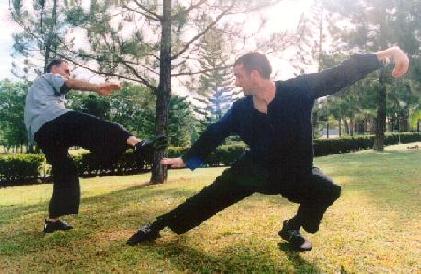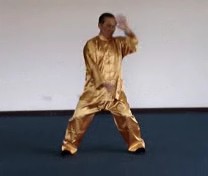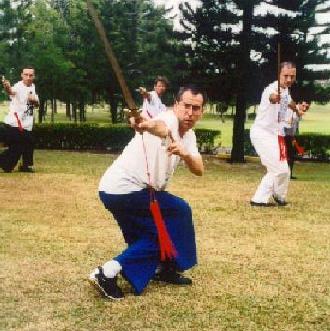September 2002 (Part 3)
SELECTION OF QUESTIONS AND ANSWERS

As Roberto executes a fast side kick, Jeffrey responds with “Low Stance Single Whip”. Jeffrey does not have to think; his response is spontaneous. But this does not mean the response is thoughtless, the “thinking” was done before by countless masters and has been programmed into systematic combat training.
Question 1
I have to go through National Service in the Army. My difficulties lie in balancing physical training like push-ups, sit-ups and jogging, with qigong and Taijiquan. How can I balance it? From your answers, it seems that whatever benefit I get from Taijiquan and qigong is negated by hard physical training. Kindly advise me what I can do.
— Uang, Singapore
Answer
I have advised against performing Taijiquan and qigong as physical exercise — something that most Taijiquan and qigong students do, but I have never said that the benefits from Taijiquan and qigong would be negated by hard physical training.
Don't forget that qigong also involves physical training, and some types of qigong like zhan zhuang and Iron Palm involve very hard physical training. The difference is that physical exercise trains only the physical body, but qigong trains the physical body, energy and mind.
If you have practised genuine Taijiquan and genuine qigong — not merely Taijiquan dance and external qigong forms — you will be able to perform physical exercise like push-ups, sit-ups and jogging easier and better. The benefits you have derived from Taijiquan and qigong, like deeper breaths and clearer mind, will counter-balance the side effects of physical exercise, like short of breaths and slowing down of thinking process due to toxic waste rising to the brain.
Better still, you can transfer your qigong skills to physical exercise and change it into qigong exercise. For example, in your push-ups, breathe in gently through your nose as you lower your body and breathe out through your mouth as you push up. In sit-ups, breathe out through your mouth as you bend your body forward, and breathe in through your nose as you sit up. In jogging, breathe in gently through your nose as you jog ten steps, and breathe out through your mouth as you jog the next ten steps.
It is important that you must not tense your muscles in your push-ups, sit-ups and jogging. If you practise regularly, you will find that not only your muscles have become strong and supple, you will also have more strength, stamina and mental clarity.
Question 2
It seems now that I may be wasting my time. I want to improve my Taijiquan, and yet am compelled to do hard physical training.
Answer
Physical training as well as going through National Service are not a waste of time. What is the use of your Taijiquan training if you cannot even do push-ups, sit-ups or jogging like ordinary people do? Among other benefits, Taijiquan training makes you physically fit, which means that you can do physical exercise or tasks more efficiently.
You are very lucky to be a citizen of Singapore, which has one of the highest levels of living in the world and where people may walk about any time without fear of being abused. You will better appreciate how lucky you are if you imagine yourself living in a country where food is scare even though you work hard, or where being attacked for no reason is not uncommon.
You may disagree with some of your government policies or vote for the opposition, but you must never forget what your country has done for you. Going for National Service is one way you can thank your country, and you should be proud of it. It is also one way you can manifest an important ideal in Taijiquan or any martial art training, that is you are ready to defend the peace and prosperity your country has given you.
Question 3
I am interested to learn Taijiquan for both its health benefits and as a combat art. However, I have yet to find one which is suitable to my situation. They are either too far away in terms of location or it is without proper guidance, meaning to say I would just have to join in the group consisting of those who are more senior than me and follow their body movements. In some places there are proper classes, as an additional programme/activity organised by a certain fitness club and those can be quite expensive since I will have to enrol as a member for the entire health club.
— Zahirir, Malaysia
Answer
Today, finding a master who will teach you Taijiquan for both health benefits and combat efficiency is difficult anywhere in the world even if you are willing to pay high fees. But if you are contented with some dance-like Taijiquan movements which may give you some health benefits but will be inadequate for you to defend yourself, there are many such Taiji classes around.
You must of course be abide by their terms. You cannot be so unreasonable, for example, to expect an existing class to start again from fresh just because you join as a beginner. If you do not like to join a class half way, you will have to wait for a new class to start.
When you learn Taijiquan or even Taiji dance, or anything for that matter from a teacher, you have to follow his terms, especially when you only want to pay a low fee. Even if you want to pay a very high fee, you should not tell the teacher how to teach you. Not only you would be disrespectful and thus you would not be in a suitable frame of mind to get the best from his teaching, but also if you do and he follows your instructions instead of you following his, he is unlikely to be a good teacher, in which case you would be wasting your time and money.
Question 4
I guess if the price is right and proper training is provided, I would not mind devoting my time to it. I live in Damansara, hence location has to be right too. I am also currently a working adult, so I am hoping I can fill up some of my empty nights after work.
Answer
You may not realize it, but you seem to think that Taiji classes exist just for your convenience and you are doing them a favour by condescending to learn.
If you wish to learn Taijiquan for combat, not only you have to pay a high price, you also have to work very hard and accept your teacher as a master, not merely as a facilitator. Devotion to an art is not just filling up your empty nights after work; you may have to take time off from your work, play or sleep for your art.
But if you just want to fill up some empty nights, you can conveniently join any Taiji dance class near your house. It does not matter much whether you join the class at the start, in the middle or at the end. If a Taiji dance class is not available nearly, you can join a tango, a cha-cha or any dance class nearby, or any wholesome youth activities organized by many youth clubs often at low prices or free as a community service.

To say Taijiquan is gentle does not mean it is not forceful. Taijiquan can be very powerful. But its force is not brutal; it is internal. In this photograph, Sifu Wong is developing internal force using the pattern “Cloud Hands”. If one observes closely, he may notice Sifu Wong's arms and body are charged with internal force.
Question 5
I'm having a hard time trying to find a southern style of kung-fu that will suit me. I'm also confused about what styles are southern. I'm hopping that you will help me find the right kung-fu style for me.
— Jason, USA
Answer
Southern styles refer to various styles of Southern Shaolin Kungfu, such as Hoong Ka (Hung Gar), Wing Choon (Wing Chun), Choy-Li-Fatt, Lau Ka, and Mok Ka.
Which style is best for you depends on various factors, such as availability, the teacher teaching the style, your classmates, as well as your personal likes and interest. If all other things were equal, an assumption that is not valid in real life, I would recommend Hoong Ka.
Question 6
Which style do you think is the most effective in combat?
Answer
If all other things were equal, Shaolin Kungfu is the most effective for combat. But, again, the assumption that all other things were equal, is almost never valid. For example, although there is much more in Shaolin Kungfu than in Wing Choon Kungfu, an ordinary Shaolin Kungfu student will be no match against a Wing Choon master.
Question 7
I was wondering if you could tell me why after practising self manifested chi movement, I felt slightly sick, like being sea sick.
— Tom, England
Answer
There were two possibilities. One, you practised wrongly, probably tensing your muscles or thinking of countless things during practice.
Two, the chi you generated was cleansing away toxic waste in your head. While the toxic waste was not cleansed out yet and floating about in your head, you might feel sick. You should open your mouth wide during the self-manifested chi movement.
Question 8
I have read somewhere that Tai Chi Chuan is not a “gentle” but a violent martial art. It is true that Tai Chi Chuan exponents practice the martial art gently, coordinating the postures and visualizing chi flow at the same time. I know that the correct postures and chi flow help promote health and simultaneously promote efficiency in combat. But I have also read that practising chi kung activates your “reptile brain.”
— Steven, USA
Answer
Of all the martial arts in the world, Taijiquan is the most gentle. If someone is aggressive, practising Taijiquan may help to tone down his aggressiveness. On the other hand, there are some martial arts which actually make originally gentle persons aggressive if they pursue those arts for some time.
One becomes gentle through Taijiquan training not because he is told to be so by his teacher, but because of the nature of the art which brings about intrinsic development in gentleness, gracefulness and inner peace. On the other hand, in some martial arts even though their teachers may talk about spirituality, the nature of their training make their students aggressive.
The gentleness of Taijiquan is not only in the form, but also in the other two aspects of energy flow and mind. If the exponent is tensed in his form, energy flow or mind — which would happen if he becomes aggressive — his performance and efficiency will be unfavourably affected. In other words, if he wishes to be effective he has to be gentle.
But one must note that being gentle is not necessarily being without force. It is interesting that in Taijiquan, the more gentle you are, the more forceful you become. This is something many people would not understand and therefore would not believe. But if you examine Taijiquan classics, all established masters have said this. More significantly, virtually all those who have attended my Taijiquan courses and classes have direct experience of this remarkable phenomenon.

Taijiquan is a gentle and very effective martial art. Its gentleness as well as elegance and gracefulness are well expressed here by, from left, Roberto, Riccardo, Jorge and Inaki in their training of the Wudang Sword, the most representative weapon of Taijiquan.
Question 9
The “reptile brain” is basically located in the back of your brain and it is triggered when there is a need for survival. It also has healing effects. When in combat, the Tai Chi Chuan exponent would go into Reptile Mode and watch everything happen in slow motion, therefore giving him/her time to respond quickly and efficiently to attacks without thinking.
Answer
Describing the meditative state of mind of a Taijiquan exponent in combat as going into “Reptile Mode” is an example of imposing Western concept into an Eastern art without fully understanding the similarities and differences involved. Often such an imposition is inappropriate because the paradigms in which the concept and the art operate are different.
Such imposition is often done by experts or masters who, despite being knowledge in their respective fields, may not realize the paradigm difference. For example, modern Chinese language teachers tried to describe the Chinese language using English grammar, but it didn't work. Many scientists researching into the effectiveness of chi kung in overcoming diseases use Western medical parameters in their research. Personally I believe this is inappropriate because chi kung and Western medicine use different paradigms.
Question 10
Activating the reptile brain is basically going into survival mode. Reptiles like snakes, for instance, do not think but respond automatically when it is attacked. If you give the snake some food, it will eat it since it needs food for survival. Reptiles don't think but survive, much like how Tai Chi Chuan or other kungfu masters skilled in chi kung don't think but respond to attacks quickly and efficiently. If this is true, then this is another reason why Tai Chi Chuan and Shaolin Kungfu is superior to other martial arts.
Answer
Your observation is incorrect. It is true that in combat, Taijiquan and other kungfu masters respond spontaneously, but it is not true that they don't think. It is also not true that they always think before responding. Most of the time they do not think in the usual sense of the word. If they do, they would be unable to respond spontaneously. It is also not true that they do not think in the usual sense of the word. If it is so, they would be fighting like children.
Indeed, it is mainly due to failing to understand this aspect of combat training that many Taijiquan and other kungfu students cannot apply their techniques in sparring. When their opponents attack them, for example, if they think of what techniques to use to respond to the attacks, their respond would be too slow and they would be hit. If they do not think but respond instinctively, they would be fighting instinctively, which is like children's fighting. In other words, they would be fighting artlessly, throwing all the techniques they have learnt to the wind.
Then, what exactly do the masters do? How is it possible that they do not think, and yet they think. There is no play of words; the apparent confusion results because words do not express meanings exactly. The masters' responses are not thoughtless responses; they are responses well thought of for the particular combat situations. But the thinking is done not during the moment of application. Often the thinking is not done by the particular master himself, but was done by generations of past masters who had crystallized well-thought-of responses into combat sequences.
The following explanation will make this point clearer. Suppose that during combat an opponent gives a Taijiquan master a fast side kick. The master does not start thinking, “Now, what should I do to respond to this fast side kick”. Spontaneously he lowers himself into “Low Stance Single Whip” to avoid the kick. Why does he use “Low Stance Single Whip” instead of bouncing away instinctively as many untrained persons would do? Because he has been trained to fight artfully, not just instinctively.
But why does he use “Low Stance Single Whip” and not other Taijiquan patterns like “Golden Cockerel” or “Green Dragon Shoots Pearl”? Because generations of past masters had thought of this question, and had found that “Low Stance Single Whip” gave the best technical advantage in such a combat situation.
Then, how does this present day master be able to put this line of thinking into his spontaneous response? It has been programmed into him through systematic training in combat application.
Nevertheless, while such spontaneous responses are normal, sometimes the master does think while in combat. While the fast side kick is coming, the master may reason, “Instead of merely avoiding his kick using ”Low Stance Single Whip“, I can use ”Green Dragon Shoots Pearl“ to brush aside the kick and immediately strike him, even before he has time to lower his kicking leg onto the ground.” Will the master be fast enough to think and act accordingly? He will, because he is a master, which means he has undergone years of systematic training.
Hence, it is quite clear that the master's mind is not the same as the “reptile brain” you described. In Taijiquan, the proper term for this state of the master's mind is “ru jing”, or “entering silence”, which is entering a heightened level of consciousness. In Shaolin Kungfu it is called “ru chan”, or “entering Zen”. It is obvious that whoever suggested that the master's mind is a “reptile brain” not only had no exposure to such systematic combat training, he might not even have heard about “ru jing” or “ru chan”.
Taijiquan and Shaolin Kungfu are superior to other martial arts not because their exponents possess “reptile brain”, but, among many other things, they are able to function at heightened levels of consciousness, which means their thinking is fast, clear and accurate not only in combat but also in daily life.
